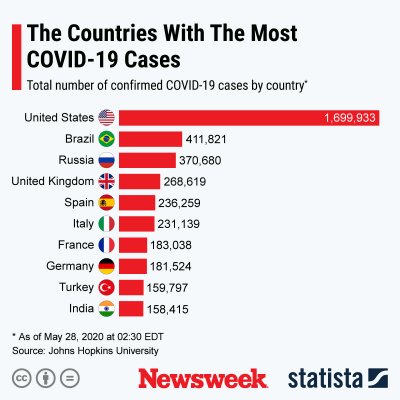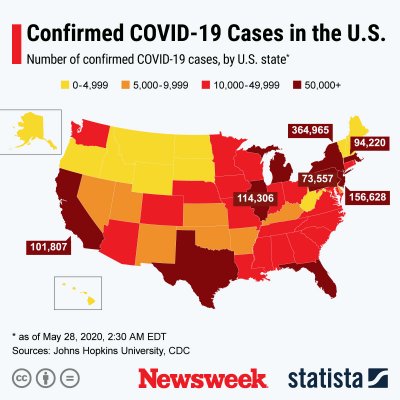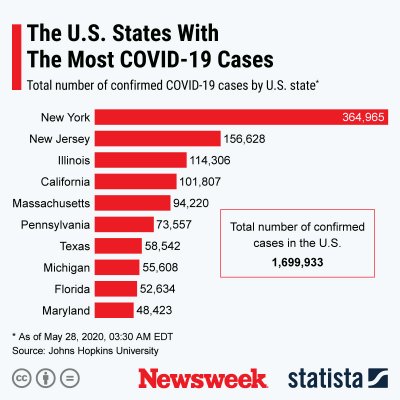The coronavirus that causes COVID-19 may not have originated from a wet market in the central Chinese city of Wuhan, the original epicenter of the pandemic, according to a study.
COVID-19 first came to public attention in late December 2019 when people linked to the Huanan Seafood Wholesale Market in Wuhan, Hubei province, started falling ill with pneumonia after catching a then-unknown virus. Since then, the coronavirus has spread almost worldwide, killing 360,860 people in over 5.8 million cases, according to Johns Hopkins University. More than 2.4 million people are known to have recovered from COVID-19, for which there is currently no specific treatment.
The Chinese scientists who published their findings in Nature are the latest to suggest the virus may have emerged elsewhere. They suggest it could have jumped from an animal to a human in late November 2019, and the busy seafood market may have helped it spread. Citing past research, the authors said a "significant" number of the first reported cases didn't have contact with the market.

To reach this conclusion, Fudan University virologist Xiaonan Zhang and colleagues looked at data on how COVID-19 affected 326 patients in Shanghai on China's east coast between January 20 and February 25, 2020. From the spit and inner nose swabs taken from these patients, they pinpointed 94 genome sequences of SARS-CoV-2 (the coronavirus that causes COVID-19) that were of a high enough quality to analyze, and compared them with others from a worldwide database. This enabled them to assemble what is essentially an evolutionary family tree of the virus. In what is known as phylogenetic analysis, scientists can use such information to do a range of things, including mapping where outbreaks started.
The team wrote: "Two major lineages of the virus derived from one common ancestor may have originated independently from Wuhan in December 2019 and contributed to the current pandemic." One of these spawned at the market, "where high density of stalls, vendors and customers might have facilitated human-to-human transmission," they wrote. Six cases in the first lineage had contact history with the market, but three cases in the second lineage diagnosed at the same period didn't. This is consistent with a study on the earliest cases in Wuhan before December 18, where five out of seven patients were not linked to the market, the researchers said.
Experts who did not work on the study who spoke to Newsweek had differing views on whether the virus came from the market.
Jeremy Rossman, honorary senior lecturer in virology at the U.K.'s University of Kent, told Newsweek evidence suggests that the virus jumped from the human population in November 2019 and "the market was simply the first site of extensive human-to-human transmission."
In a paper published by Chinese researchers in The Lancet journal in January 2020 on the first 41 patients hospitalized with COVID-19, the earliest case fell ill on December 1, 2019. The person had no known link to the market, as was also the case for 13 others featured in the study.
Rossman said: "Other groups have identified two early lineages of the virus, but this is the first suggestion that this split occurred before the infection at the market.
"Together, this paper and the existing data offer a convincing view that SARS-CoV-2 did not first emerge at the Huanan Seafood Market in Wuhan in December 2019, but earlier in November, in some as yet unidentified location in the general area of Wuhan."
Addressing past allegations by President Donald Trump and Secretary of State Mike Pompeo that the virus escaped from the Wuhan Institute of Virology, Ian Jones, professor of virology at the University of Reading, U.K., who did not work on the study, told Newsweek: "That theory has been well and truly trashed by scientific analysis of the virus and should now be buried."
Jones said the Nature study was limited due to the small number of samples the team analyzed. He said: "It remains possible the first events did occur in the market but sometime before the main cluster of cases were identified, by which time one (presumably) individual had left the market and begun transmission outside."
Andrew Preston, who researches microbial pathogenesis at the University of Bath, U.K., told Newsweek that current evidence suggests the virus originated from the market.
Preston said it is "very difficult to reach a conclusion" that there were two types of SARS-CoV-2 introduced into people in Wuhan.
"When analyzing a subset of viruses, sampling can have a large effect. The virus mutates naturally, so mutations will arise all of the time. If one variant happened to find its way into someone who then passed it on to a lot of people, (maybe because they were asymptomatic and didn't isolate, maybe because they happened to contact a lot of people before becoming ill, etc.) then that virus will appear in a lot more people than a virus that was carried by someone who didn't pass it on a lot. So that virus will appear to be more common," he said.
Preston said it's possible the analysis picked up a variant that arose in a person who was exposed to the market, but then passed it on to people who weren't. "If you then sample only from those people who weren't, it will appear that their virus arose outside of the market."
However, Peter Forster, fellow of the McDonald Institute for Archaeological Research at the U.K.'s University of Cambridge, told Newsweek he was not surprised the fish market does not fully qualify as the source of the COVID-19 outbreak, citing The Lancet study. "Unfortunately there is no genomic information for this patient, as far as I know, which limits further investigation on the true origins of the outbreak," he said.
In research yet to be peer-reviewed, Forster and colleagues analyzed 1,001 SARS-CoV-2 genomes and found it may have infected people as early as mid-September.
Jones said that is unclear whether the exact location or animal where the virus came from will ever be found.
As the graph by Statista below shows, the U.S. is the country with the most known COVID-19 cases. This week, the death toll in that country passed 100,000.
1 of 3




Health - Latest - Google News
May 29, 2020 at 10:19PM
https://ift.tt/2MaUxFh
Wuhan Seafood Market Probably Wasn't Origin of Coronavirus Pandemic, Chinese Scientists Say - Newsweek
Health - Latest - Google News
https://ift.tt/2zrj9Ud
Bagikan Berita Ini














0 Response to "Wuhan Seafood Market Probably Wasn't Origin of Coronavirus Pandemic, Chinese Scientists Say - Newsweek"
Post a Comment